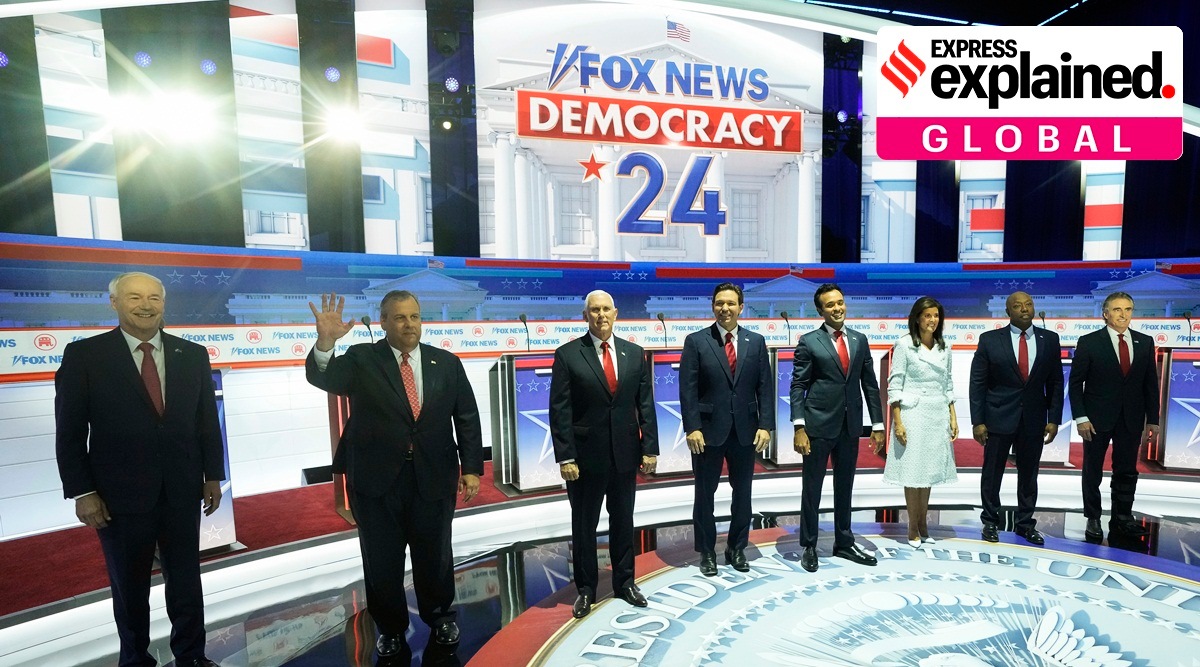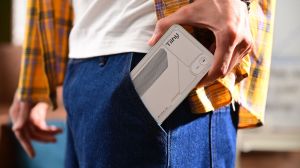Former US President Donald Trump appeared in Georgia’s Fulton County prison on Thursday (August 24), where his mugshot was taken. He was earlier charged under Georgia’s anti-racketeering law for crimes related to his alleged efforts to overturn the 2020 presidential election result in the state.
But many believe this is unlikely to dent his popularity. It may even bolster support for him, with the Presidential elections campaigning beginning for the 2024 polls. Continuing his unusual campaign, Trump has also refused to participate in a well-known part of the US political process – the televised debates.

This includes “primary debates” held in the campaign’s early stages, featuring multiple candidates from each party. They all compete for support from voters affiliated with their parties, who can help them become their parties’ official candidates through local polls. Once each party selects their official candidates, debates are held between both the official Republican and Democratic candidates (what are called Presidential debates). “The public knows who I am & what a successful Presidency I had,” Trump wrote on his social media site, adding, “I WILL THEREFORE NOT BE DOING THE DEBATES!”
How televised election debates began in the US elections
According to Charleston College professors Gibbs Knotts and Vince Benigni, Presidential debates are the “historical linchpin of modern American politics”. They wrote in The Conversation, “Debates put the major contenders on the same stage and allow voters the opportunity to see how candidates explain – and defend – their policy positions.”
They trace back the tradition to 1858, to debates between then-Republican Senate candidate Abraham Lincoln and Democrat leader Stephen Douglas. The central issue of these debates was slavery and whether it was to continue. Hours-long debates were held in the run-up to elections to the Senate. Lincoln lost the race, but his profile would rise in time for the 1860 Presidential elections, which he won.
Similarly, the first-ever debate on the broadcast was probably between Thomas Dewey, governor of New York, and Harold Stassen, a former governor of Minnesota, in 1948. They discussed whether the Communist Party, then gaining ground in countries around the world, should be banned in the US. Both the leaders were seeking the Republican nomination for the presidency.
With an audience of 40 million, the NPR notes, Dewey was considered as having done better. He “won the Oregon primary four days later with 52 percent of the vote over Stassen’s 48 percent. That was enough to stop Stassen’s spring boomlet and deliver the nomination to Dewey,” it reported.
Story continues below this ad
The first televised debate between two rival candidates is considered to be between Republican Richard Nixon and Democrat John F. Kennedy in 1960. But debates among candidates of the same party had happened before this. One in 1956 featured Democrat and former Illinois Governor Adlai Stevenson and Senator Estes Kefauver, another Democrat. Stevenson later won the party’s nomination and became its Presidential candidate, picking Kefauver as his Vice Presidential running mate. However, they lost in the Presidential elections to Dwight Eisenhower.
The non-profit Commission on Presidential Debates was established in 1987 “to ensure, for the benefit of the American electorate, that general election debates between or among the leading candidates for the offices of President and Vice President of the United States are a permanent part of the electoral process,” and has sponsored all the debates since 1988. Few Presidential debates have been refused, such as by Nixon, after his less-than-satisfactory performance against Kennedy in 1960.
Do televised debates influence how candidates vote in the US elections?
Evidence is mixed. According to post-election surveys conducted by the Pew Research Center since 1988, in most cases, three-fifths or more of the voters said that the debates were “very or somewhat helpful” in deciding which candidate to vote for.
The Conversation’s article recalls when Republican incumbent Gerald Ford agreed to debate Democratic challenger Jimmy Carter in 1976. There were three debates on domestic policy, foreign policy, etc. “Carter credited the debates for his win, noting that ‘They established me as competent on foreign and domestic affairs and gave the viewers reason to think that Jimmy Carter had something to offer’”, it says.
Story continues below this ad
It cites communication scholars Mitchell McKinney and Benjamin Warner as showing through their research the importance of primary debates, particularly. Unlike election debates at a later stage, say between Joe Biden and Donald Trump, unfamiliarity with candidates is a novel aspect here.
“They analyzed surveys of general election and primary debate viewers between 2000 and 2012 and discovered that only 3.5% of general election viewers switched from one candidate to the other, but 35% of primary election viewers changed their candidate preference,” it says.
But Pew has said that this doesn’t necessarily mean that large numbers of voters are waiting for the debates to make up their minds. For instance, in the 2016 debates between Clinton and Trump, only 10 per cent of the voters said that “they had definitively made up their minds “during or just after” the presidential debates.”
Also, as a Scientific American article (‘Presidential Debates Have Shockingly Little Effect on Election Outcomes’) noted in 2020 that “debates neither helped undecided voters to make up their mind nor caused those who had already made a decision to switch candidates.” This was based on a study of around 94,000 people, who were interviewed before and after an election, to see who they planned to vote for and who they actually wound up choosing.
Story continues below this ad
It outlined some factors behind this. Those who are as invested in politics to tune in to debates at all might already have strong opinions. They are unlikely to change their candidate preferences, particularly in a time of political polarisation. Also, the US only has two political parties and people are usually open about their political affiliations, identifying as Democrats and Republicans. So to then become convinced by another party’s candidate, to the point of switching affiliations, is not very likely.
During the 2016 election cycle, the debate moderators – usually journalists – were also criticised for not outrightly fact-checking the candidates’ comments. When journalist and moderator Chris Wallace was asked a question about calling out statements that he knew were false, he said “That’s not my job. I do not believe it is my job to be a truth squad. It’s up to the other person to catch them on that…” But where there has been criticism, there has also been an acknowledgement that fact-checking such debates and shifts the focus on the moderators. It also raises questions of bias, and how it may lead to calling out only certain statements.
Why do candidates appear in these debates, then?
For all their limitations, debates still offer a glimpse into the stand of candidates on a range of matters and their general conduct. In a time when communication means were limited, particularly when it came to mass communication, the visibility accorded to candidates by national coverage was unparalleled. Even now, with candidates like Ron DeSantis taking to X (formerly Twitter) to announce their candidature, traditional means of participation have attracted eyeballs and generated online conversation.
One example is Vivek Ramaswamy, a Republican candidate who has not garnered significant support according to voter polls, as of late August. However, his appearance on the Wednesday debate led to this campaign receiving $450,000 in the days since, with an average donation of $38, campaign spokeswoman Tricia McLaughlin told The Associated Press.
Story continues below this ad
In that regard, debates can provide a chance to go viral or launch an attack that gets widely discussed, bumping up little-known candidates’ name recognition value among voters.







































